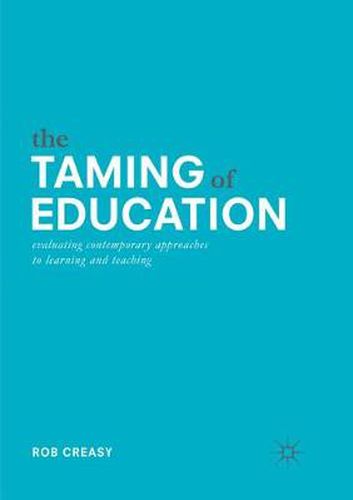Readings Newsletter
Become a Readings Member to make your shopping experience even easier.
Sign in or sign up for free!
You’re not far away from qualifying for FREE standard shipping within Australia
You’ve qualified for FREE standard shipping within Australia
The cart is loading…






This book evaluates contemporary approaches to education, with a particular focus on the ways in which assessment shapes the educational experience and influences pupils and students. It adopts a critical approach, arguing that there is a need for students to develop critical thinking skills, be flexible and have the capacity for originality. Education has increasingly come to be seen as a process with qualifications as the output; however, as economies change, attaining advantage increasingly relies on creativity and originality. Unfortunately, in the quest to remove uncertainty from education, creativity and originality are often overlooked; and the result is that education is impoverished. Creasy argues here that there is no single factor that has shaped education and led to this situation; rather, developments within education can be seen as having been shaped by a range of forces such as neoliberalism, New Public Management, standardization and internationalization. This is not to claim any deliberate undermining of education, but the cumulative effect is that education is less and less fit for purpose. Written for anyone involved in education, student, teacher or manager, this book draws upon Educations Studies, Sociology and Social Policy to offer a compelling critique of contemporary education.
$9.00 standard shipping within Australia
FREE standard shipping within Australia for orders over $100.00
Express & International shipping calculated at checkout
This book evaluates contemporary approaches to education, with a particular focus on the ways in which assessment shapes the educational experience and influences pupils and students. It adopts a critical approach, arguing that there is a need for students to develop critical thinking skills, be flexible and have the capacity for originality. Education has increasingly come to be seen as a process with qualifications as the output; however, as economies change, attaining advantage increasingly relies on creativity and originality. Unfortunately, in the quest to remove uncertainty from education, creativity and originality are often overlooked; and the result is that education is impoverished. Creasy argues here that there is no single factor that has shaped education and led to this situation; rather, developments within education can be seen as having been shaped by a range of forces such as neoliberalism, New Public Management, standardization and internationalization. This is not to claim any deliberate undermining of education, but the cumulative effect is that education is less and less fit for purpose. Written for anyone involved in education, student, teacher or manager, this book draws upon Educations Studies, Sociology and Social Policy to offer a compelling critique of contemporary education.